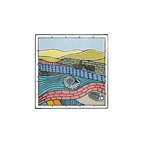Lay-by of the Week: Laxford Bridge
Monday, 22 March, 2010. Filed under: Landscapes
When the Highland Council made the A838, in the far north-west of Scotland, wider in 1991, a number of cuttings were made to accommodate the new carriageway, one of which has now become the site of the most fascinating lay-by in the country.
So, another week, another lay-by, but this isn't any normal picturesque view but one which labours under the name of the Multi-Coloured Rock Stop. Some might find the joviality annoying but arguments about the presentation of science aside, the Multi-Coloured Rock Stop is an astounding feature. Three different ages of rock can be distinguished on the cutting opposite this layby and even the artefacts left behind by the road contractor's rock drills, the regular parallel incisions down the rock face, only add to the effect.
View Larger Map
The oldest rock here - the pale grey one - is one of the ancient Lewisian Gneisses of the North West Highlands, a rock that was brewed at high temperatures and under great pressure miles underground billions of years ago. Swirling across it with the twisted teardrop freedom of a Paisley pattern, is a dark brown-black basalt which, as molten rock, squeezed through a weakness in the gneiss. Finally, streaks of pink granite cut through both the gneiss and the basalt dyke and so must be the youngest of all three.
So, another week, another lay-by, but this isn't any normal picturesque view but one which labours under the name of the Multi-Coloured Rock Stop. Some might find the joviality annoying but arguments about the presentation of science aside, the Multi-Coloured Rock Stop is an astounding feature. Three different ages of rock can be distinguished on the cutting opposite this layby and even the artefacts left behind by the road contractor's rock drills, the regular parallel incisions down the rock face, only add to the effect.
View Larger Map
The oldest rock here - the pale grey one - is one of the ancient Lewisian Gneisses of the North West Highlands, a rock that was brewed at high temperatures and under great pressure miles underground billions of years ago. Swirling across it with the twisted teardrop freedom of a Paisley pattern, is a dark brown-black basalt which, as molten rock, squeezed through a weakness in the gneiss. Finally, streaks of pink granite cut through both the gneiss and the basalt dyke and so must be the youngest of all three.
blog comments powered by Disqus

